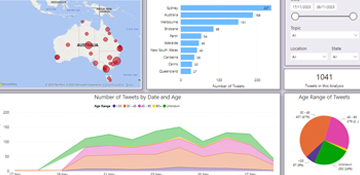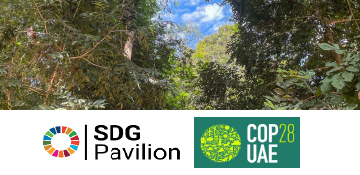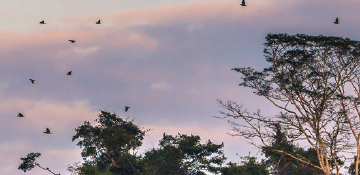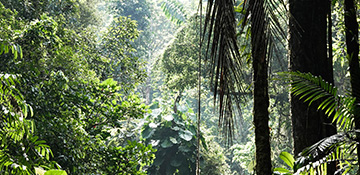Join us at an event or view a recording
The Climate Action Beacon hosts and presents at various events, including conferences, public seminars and community workshops. Explore events, event recordings, and video series below and keep in the loop by joining our mailing list.
Sustainable Development Goals
Griffith University is committed to advancing sustainable development through comprehensive initiatives that promote economic prosperity, social inclusion, environmental sustainability and good governance for all.
Climate Action Beacon at the COP 28

As disasters and heat intensify, can the world meet the urgency of the moment at the COP28 climate talks? - 30 November 2023
Prof Brendan Mackey, Director, Climate Action Beacon, is off to COP 28 with a packed schedule - Launching the Forest carbon and Protected Area app - Speaking at the COP side event: Delivering integrated nature & climate action in the Global Stocktake & beyond - Speaking at the Climate & Canopy: Amplifying action for SDG 13 and 15 through primary forest conservation - Speaking at the "From Agreement to Action: Harnessing 30X30 to tackle climate change" - and participating in the Collaborators Roundtable ‐ We Are Family. In the meantime read his take on COP in The Conversation.

COP 28 Twitter/X Climate Sentiment Dashboard - 30 November 2023
The Climate Action Beacon's big data research project built a custom dashboard to track twitter posts by Australians before, during and after the Conference of the Parties (COP 28) in Dubai, United Arab Emirates in 2023. Applying big data analytics and expert analysis, the dashboard has been using key words to analyse Australian twitter feeds in close to real-time since 17 November 2023.

Natural Forests and Mitigation Policy Brief - 30 November 2023
This Science information Policy Briefing Note from the Griffith University Climate Action Beacon has been prepared for the United Nations Climate COP 28. This Briefing Note provides information on the contribution of natural forests, including primary forests and intact forest landscapes, to climate mitigation and meeting the Paris Agreement’s long term temperature goal and intermediate targets as guided by science.

COP 28 Side Event - Climate & Canopy: Amplifying Action for SDG 13 & 15 through Primary Forest Conservation - 8 December 2023
Join Prof Brendan Mackey at COP 28 in this side event on primary forests which will foster better understanding and awareness of the importance of enhancing the conservation of primary forests, and explore concrete next steps to be taken to champion primary forest conservation, seamlessly intertwining the objectives of SDG 13 (Climate Action) and SDG 15 (Life on Land).

COP 28 Side Event - Delivering integrated nature and climate action in the Global Stocktake (GST) and beyond - 10 December 2023
The GST presents a critical opportunity to integrate climate and biodiversity action across the UNFCCC and the Convention on Biological Diversity. Panelists, including Prof Mackey, will set out what is needed from the GST at COP28, share on-the-ground case studies, explore the significance of ecosystem integrity for evaluating approaches, and outline a pathway to prevent perverse outcomes for nature and people.

COP 28 Panel Discussion - Integrating Indigenous’ Perspectives into Higher Education Curricula - 12 December 2023
Join Prof Brendan Mackey at COP 28 explore the integration of Indigenous perspectives and content into higher education. This panel will facilitate discussions on educational experiences, effective pedagogical approaches, and contemplate an initial roadmap for curriculum development. The panel will also address strategies for evaluating the impact of introducing Indigenous perspectives into university curricula.

Radio interview - Prof Mackey speaks to Matthew Pantellis about COP 28 (Fiveaa) - 30 November 2023
Prof Brendan Mackey, Director, Griffith Climate Action Beacon, Griffith University speaks with Matthew Pantelis (Fiveaa) about COP 28, the conference addressing climate change.

International Union for Conservation of Nature (IUCN) Technical Briefs for COP 28 - November 2023
This IUCN Technical Brief - Connecting the Dots: Achieving synergistic action for global biodiversity and climate goals utilising the Kunming-Montreal Global Biodiversity Framework - concludes that given the functional roles of biodiversity in ecosystem processes, its protection and restoration is essential for conserving carbon reservoirs in the biosphere and achieving the mitigation goals of the Paris Agreement.
Read the IUCN Technical Brief about Connecting the Dots
Also read the IUCN Technical Brief about Primary Forests, Ecosystem Integrity & Climate Change
Aviation Reimagined Series
Recordings and Video Series
Climate Action Webinar Series
May 2025: Prospects for a National Climate Beacon Centre
Griffith University's Climate Action Beacon is collaborating with CSIRO to develop a National Climate Beacon Centre which will function as a national hub for identifying and directing funding, coordinating and advancing collaborative climate action research. This centre will also focus on sharing best practices and policies, as well as building collective capability and capacity across government, sectors and society to support climate transition planning and implementation through research and practice-based learning and application. Prof Mackey provided an overview of the NCBC initiative, followed by a panel discussion with CSIRO colleagues and a Q&A.December 2024: Yes, we still have a climate crisis!
What happened at Climate COP29 and what does this mean for a climate ready world? Presented by Professor Brendan Mackey, Director of the Climate Action Beacon. In this CAB webinar, Prof Mackey provided an update on the climate crisis with a focus on the major outcomes from COP29, the state of play regarding climate finance, the growing mitigation gap and the implications for climate risks and limits to adaptation, along with prospects for the necessary transformational changes needed in all sectors.November 2024: Longitudinal Insights from the National Climate Action Survey
This presentation explored the key insights from the third iteration of the Griffith National Climate Action Survey. Since 2021, the team has surveyed around 4,000 Australians annually to understand their attitudes, beliefs, and actions regarding climate change and environmental issues. This webinar delved into the survey’s robust methodology, highlighted some of the most significant findings from the latest data, and discussed the potential implications. It also touched upon the future of climate action survey research, including this years’ survey, and how the team plan to expand study to gain deeper insights into evolving public attitudes.October 2024: DORIS - Digital Oracle for Research in Sciences
DORIS: GenerativeAI system built on Large Language Model fine-tuned with trusted climate change data. In this talk, Prof Bela Stantic first elaborated on diverse funded projects at the Big Data and Smart Analytics lab at Griffith University. Many of these projects rely on pre-trained-transformers, large language models, and GenAI. Attention was given to clarifying what GenAI can offer and what that means from the know-how and computing power point of view. The presentation included demonstrations of several pre-trained and fine-tuned large language models and GenAI running locally on the Griffith Big Data cluster. Main attention was given to introduce the architecture of DORIS, a GenAI system developed and purposely trained Large Language Model with trusted climate change related data sources obtained from IPCC.September 2024: Building Organisational Capabilities for Managing Climate Risk: Part 2
Presented by the Griffith Climate Ready Initiative team This presentation explores how CRI supported Queensland Government to build organisational capability to progress climate risk under the Queensland Climate Ready Program, and provides a short taster of the Becoming Climate Ready Micro-credential short course developed for local government. The presentation outlines how you can get involved with CRI activities, either through training programs or through opportunities to engage CRI to support project delivery.September, 2024: Building Organisational Capabilities for Managing Climate Risk: Part 1
Presented by the Griffith Climate Ready Initiative team This presentation explores how CRI supported Queensland Government to build organisational capability to progress climate risk under the Queensland Climate Ready Program, and provides a short taster of the Becoming Climate Ready Micro-credential short course developed for local government. The presentation outlines how you can get involved with CRI activities, either through training programs or through opportunities to engage CRI to support project delivery.July 2024: Transdisciplinary Research to Address the Mental Health Impacts of a Changing Climate
Australia’s Mental Health in Climate Change Transdisciplinary Research Network was established in late 2019 in response to government, industry and community requests for new knowledge about how climate change is likely to impact social and emotional wellbeing through more frequent and extreme weather events, and for evidence-informed interventions. The work of this network aims to increase understanding about the mental health impacts of climate change and identify new opportunities to improve the social and emotional wellbeing. This seminar will present an overview of the research network, including capabilities, objectives, activities, stakeholder engagement, and current and planned projects aimed at nurturing social and emotional wellbeing in a rapidly changing climate.July 2024: Ecocide and International Criminal Law: Exploring the Criminal Threshold of Environmental Harm
Ecocide is the act/s of causing severe and either widespread or long-term damage to the environment in circumstances where the relevant unlawful or wanton act/s are committed with knowledge that there is a substantial likelihood of the damage so caused. In February this year, the Prosecutor of the International Criminal Court, Mr Karim A.A. Khan KC, announced a new policy initiative to advance accountability for environmental crimes under the Rome Statute. The International Criminal Court’s Bar Association Ecocide working group will prepare a policy paper considering the practicalities of inclusion of the crime under the Rome Statute. This talk introduced the crime of ecocide and its possible inclusion within the framework of international Criminal Law.June 2024: Apocalyptic authoritarianism climate crisis, media, and power
In this talk, Dr. Hanna E. Morris (Assistant Professor, University of Toronto) discussed her forthcoming book entitled Apocalyptic Authoritarianism: Climate Crisis, Media, and Power (Oxford University Press). Through this discussion, Dr. Morris detailed the ways in which national anxieties following the 2016 presidential election of Donald Trump have shaped and continue to shape American journalistic and political interpretations of the climate crisis in ways that severely limit how the crisis has come to be known, imagined, and contended with. In addition to interrogating the implications of these limitations, possible pathways forward for more robust forms of climate journalism were explored in this talk.June 2024: Towards eco-creativity in cultural practice
Presented by Griffith Performance + Ecology Research Lab (P+ERL) team. This session introduced the emerging concept of Eco-creativity both within and beyond the performing arts. Eco-creativity combines ecological thinking with creativity to inspire long-term solutions to environmental and social issues in cultural practice. The webinar explored how artistic imagination can be linked with ecology and environmental sustainability, thereby giving agency to practitioners and researchers to pursue climate narratives and actions in inspiring ways.Net Zero Emission commitments
March 2024: How can we promote the wise use of “Net Zero Emission” commitments
While originally a strictly scientific term, Net Zero Emissions (NZE) has taken on a more popular social meaning as evidenced by the 140 countries, 9000 companies, 1000 educational institutions and over 600 financial institutions who have made NZE pledges and to varying extents are implementing NZE plans for their organisations. Yet, there is a growing gap in understanding between these social-political commitments and the scientific meaning of NZE. In this presentation, I draw upon recent research findings to discuss this gap, why it is problematic, and how it can be closed to help ensure more effective climate action for organisations.Call to Action from the Climate Ready Australia National Summit 2023
Ethos project - Extreme Heat and Older Persons - Animation Videos
Part 1: Heat, Humidity and Health
After surveying 547 Older Queenslanders in 2022, researchers from Griffith University’s Ethos Project (Extreme Heat and Older Persons) found a staggering 75% of respondents knew little about the health consequences of heat, despite being one of the most heat-sensitive groups. To raise the profile of heat as a health problem, the Ethos research team has developed a short series of animated videos exploring the effects of extreme heat on the body and provide practical tips for keeping cool in hot weather. In part one of the video series, we will look at the impacts of high heat and humidity from the perspective of Claire, who finds her dad Martin suffering from heat related illness.Part 2: Age and Heat Health Risk
After surveying 547 Older Queenslanders in 2022, researchers from Griffith University’s Ethos Project (Extreme Heat and Older Persons) found a staggering 75% of respondents knew little about the health consequences of heat, despite being one of the most heat-sensitive groups. To raise the profile of heat as a health problem, the Ethos research team has developed a short series of animated videos exploring the effects of extreme heat on the body and provide practical tips for keeping cool in hot weather. In part two, we dive into Martin's heat health scare and explore why age plays a crucial role in heat health vulnerability.Part 3: Heatwave Ready
After surveying 547 Older Queenslanders in 2022, researchers from Griffith University’s Ethos Project (Extreme Heat and Older Persons) found a staggering 75% of respondents knew little about the health consequences of heat, despite being one of the most heat-sensitive groups. To raise the profile of heat as a health problem, the Ethos research team has developed a short series of animated videos exploring the effects of extreme heat on the body and provide practical tips for keeping cool in hot weather. We finish off our series with by sharing essential tips and tricks to stay safe and keep cool in hot weather. Watch and share to keep your loved ones safe in the heat.Altered Tides: Custodians of Our Ocean
A reflective vignette, featuring Kerrie Foxwell-Norton, Climate Action Beacon, Griffith University, as a part of Altered Tides: Custodians of our Ocean held 11 September 2023 at the SWELL Sculpture Festival. Produced by Salvador Cantellano with additional footage by Luke Workmann @Lukeworkmann and by Andrew Shield @andrewshield.
A reflective vignette, featuring Glenn Barry, First Nations Artist and SWELL Director, as a part of Altered Tides: Custodians of our Ocean held 11 September 2023 at the SWELL Sculpture Festival. Produced by Salvador Cantellano with additional footage by Luke Workmann @Lukeworkmann and by Andrew Shield @andrewshield.
A reflective vignette, featuring David Brown, President, Gold Coast branch, Surfrider Foundation, as a part of Altered Tides: Custodians of our Ocean held 11 September 2023 at the SWELL Sculpture Festival. Produced by Salvador Cantellano with additional footage by Luke Workmann @Lukeworkmann and by Andrew Shield @andrewshield.
A reflective vignette, featuring Natasha Edwards, Artistic Director, SWELL Sculpture Festival, as a part of Altered Tides: Custodians of our Ocean held 11 September 2023 at the SWELL Sculpture Festival. Produced by Salvador Cantellano with additional footage supplied by SWELL Sculpture Festival.
A reflective vignette, featuring Sara Hicks, Climate Advocate, Gecko Environment Council, as a part of Altered Tides: Custodians of our Ocean held 11 September 2023 at the SWELL Sculpture Festival. Produced by Salvador Cantellano with additional footage by Luke Workmann @Lukeworkmann.
A recording of the Altered Tides: Custodians of our Ocean event held 11 September 2023 at the SWELL Sculpture Festival. Includes Panel discussion and Film screenings. Produced by Salvador Cantellano.
Prof Mackey presentations to the Australian Earth Laws Alliance
A recording from the Australian Earths Laws Alliance from 19 September 2023. What's the latest science on climate change and what does it mean for our local and regional communities in Australia? How can we best turn the most recent scientific information into a foundation for taking action in our work and in our personal lives? Where are the best sources of up to date information and future scenarios for our changing world? Join Professor Brendan Mackey, hosted by Dr Michelle Maloney from AELA, as we explore the most recent scientific information, and discuss what it means in practical terms, policy terms and future action. https://www.earthlaws.org.au/event/elm23-18sept-climate-change-update-with-brendan-mackey/
A recording from the Australian Earths Laws Alliance webinar series held 18 Mary 2023. As we face escalating climate breakdown, biodiversity loss and the decline of ecosystem health, governments and communities are struggling to find sufficient responses. While the science is uniquivocal - our future depends on reducing emissions and increasing nature restoration this decade - there is much debate about different policy responses. In this webinar, we scrutinize carbon and nature offsets: we explore what they are, how they operate and whether they can achieve emission reductions and nature restoration. Guests include Prof Brendan Mackey, Christine Miln, Rob White and Michelle Maloney. https://www.earthlaws.org.au/event/carbon-and-nature-offsets/
Building a Heat Resilient Queensland
The Queensland Heat Health Community of Practice (QHHCoP) recently hosted their 4th event, titled "Building a Heat Resilient Queensland," on June 20th, 2023. This unique event was conducted in a hybrid format and brought together a diverse group of experts from various fields including climate adaptation, tenant advocacy, state emergency management, local government architecture, and industry development. The event aimed to provide a platform for these experts to share their valuable insights on the latest research findings and practical strategies aimed at mitigating heat-related harm within our communities. Speakers - Prof Brendan Mackey, Ian Thompson, Liza Neil, Mark Stephens, and Joel Dignam.Floods and Farming
Farmers for Climate Action recently organised this webinar featuring experts on how climate change is causing more frequent and intense flooding; plus, farmers on the impacts on their farms, businesses, families, and communities. IPCC lead authors and Climate Action beacon director Professor Brendan Mackey is among those discussing the science behind the weather events.The Land Gap Report finds over 1 billion hectares of land is implied in countries Net-Zero or NDC pledges, more than can be assumed available. Ensuring biodiversity, food security, land rights and other ecosystem services can see land contribute to climate mitigation without creating a ‘land gap’. This is the recording from the COP 27 side event held on 12 November 2022. Prof Brendan Mackey, Dr Heather Keith, Sonia Hugh and Virginia Young from Griffith University were involved in the preparation of the Land Gap Report - https://www.landgap.org/.
A Griffith Climate Action Beacon webinar - Taking Action on Heat, Health and Climate Justice: Anecdotes - brought together some of our climate action researchers to discuss how our climate action research endeavours are considering the impacts of heat across policy, health, planning and industry. Speakers - Prof Brendan Mackey, Prof Susan Harris Rimmer, Prof Palutikof, Assoc Prof Shannon Rutherford and Dr Tony Matthews.
Griffith Climate Action Beacon - Overview - 8 November 2022
Prof Brendan Mackey, Climate Action Beacon, Director, presented to the Engineering Industry Advisory Board an overview of the Griffith University, Climate Action Beacon.
Prof Brendan Mackey presented -"The Heat is On: The latest IPCC climate science and what it means for agriculture globally, in Australia and for the Northern Rivers" - to the Adapting Agriculture for Climate Disruption Conference delivered by North Coast Regional Landcare Network, Tweed Shire Council and Tweed Landcare on 30 October 2022. The event was about increasing farmers understanding of the local impacts of climate change and adaptation options for grazing industries. Prof Mackey was a Coordinating Lead Author for the IPCC 6th Assessment Report released earlier in 2022. He is working with the National Resilient Landscape Hub on adaptation and resilience assessment and planning.
Aviation Reimagined - held 31 September to 27 October 2022
Aviation Reimagined is an annual webinar series presented by the Griffith Institute for Tourism and the Climate Action Beacon, featuring industry leaders, policymakers and researchers sharing their insights about a transition to a low-carbon future for aviation. Watch all the replays from the Aviation Reimagined Series which included sessions on - Aviation Net Zero: Policy Leadership; Sustainable Aviation Fuels; Aircraft and Airlines of Tomorrow; Transforming Our Airports; Advanced Air Mobility; and Changing Times and Future Perspectives.
Cruel Summer: A Climate Justice Manifesto for Extreme Heat Events - held 25 October 2022
There are many ideas from global practice that Australia can apply to take a human rights approach to extreme heat events. Open access publications can play an important role in terms of connecting the science with policymaking, civil-society actors and responsible businesses. In this talk Prof Susan Harris Rimmer (Lead - Climate Justice, Griffith Climate Action Beacon) explains how the Climate Justice Observatory both draws on open access works and creates new sources to share in order to drive local solutions.
Climate Science to Climate Action - held 24 October 2022
Prof Jean Palutikof, Climate Action Beacon and National Climate Adaptation Research Facility, provided a presentation - "Transitioning climate change information into policy and action: some reflections" - at the "From Climate Science to Climate Action" event hosted by the University of East Anglia. Prof Palutikof's PowerPoint presentation is available here.
Cooling sustainability for factory workers - held 18 October 2022
Hosted by the University of Oxford, Prof Jean Palutikof (Professor and Founding Director of the National Climate Change Adaptation Research Facility, Griffith University) presented a Lecture drawing from the research on present and future worker heat stress in ready-made garment factories in Bangladesh. After Prof Palutikof's presentation she was joined by her two project investigators from Griffith University for question and discussion - Aaron Bach and Fahim Tonmoy. Here are the PowerPoints from the Lecture.
CAB Director, Prof Brendan Mackey, presented at the Great Eastern Ranges (GER) Conference - Connecting People, Connecting Nature Conference which was held 18-19 October 2022 in Brisbane. The title of his presentation was - How connectivity conservation can help meet our international climate, biodiversity and ecosystem health goals.
The Gold Coast’s identity is shaped by its labyrinth of waterways. From our beaches to the rivers, creeks, canals and lakes that surround our city, our waterways are both natural and manufactured environments on a grand scale. But beyond the water views, how can we best live with, and design for, water? In a world where water is both life-giving and a destructive force, what are the socio-economic and ecosystem implications for the Gold Coast as we continue to surround ourselves with water on all sides? In this Open House Talks session our panel (including Prof Brendan Mackey) discussed whether we as a community need to revise our expectations about our relationship to water.
The science of interconnected life on Earth - held 12 September 2022
CAB Director, Prof Brendan Mackey, presented at the Australian Earth Laws Alliance (AELA) webinar, alongside Emeritus Prof Ian Lowe AO - How much DNA do you share with an octopus? The Science of Interconnected Life on Earth. The webinar explored the wonder of our interconnected Earth community, through the lens of science. It explored what science actually "is" (and what it isn't) and what scientists have learnt about the evolution of life on Earth. Prof Mackey spoke alongside Emeritus Ian Lowe at this AELA event.
Water and Wash Resources - held 20 - 23 June 2022
COVID-19 has exacerbated WASH (water, supply, sanitation and hygiene) inequalities and hampered progress on the Sustainable Development Goals. The addition of climate change is further worsening these inequalities. We now need urgent attention to achieve water management and WASH systems that are socially inclusive and resilient to, and mitigate, climate change. The Water Conference recordings, blogs and resources are available from this page.
Set the Agenda - held 27 April 2022
Dr Wes Morgan joined the Panel hosted by The Conversation to discuss how the major parties’ policies on climate stack up in the lead up to the 2022 federal election. The audience asked the experts their own climate questions and heard what respondents to The Conversation’s #SetTheAgenda poll had to say about climate change.
Planetary Well-Being in a Time of Global Crisis - held 22 April 2022
Amid the challenges of climate change, biodiversity loss, social disparity, and a lack of ethical leadership, what is our vision of Planetary Well-being and how can we contribute, and evaluate our contributions towards that through the ethical perspective of the Earth Charter? Earth Charter International, Okayama University and Griffith University Climate Action Beacon examined - What is Planetary Well-being? What are our contributions to Planetary Well-being? How can we assess / evaluate our contributions to Planetary Well-being through the Earth Charter lens?
GOLD COAST COMMUNITY CONVERSATION: REFLECTIONS ON THE LATEST IPCC REPORT
Held Thurs 31 March 2022
The Griffith Climate Action Beacon and Gecko Environment Council held a webinar discussing the latest IPCC report and what it means for the Gold Coast Community. Director of the Climate Action Beacon and IPCC Coordinating Lead Author, Prof Brendan Mackey, summarised the IPCC report findings relevant to Australia and the Pacific region, and translated these impacts to the Gold Coast context.
Answering your questions about adaptation and the IPCC report
Held 4 March 2022
Presented by the National Environmental Science Program (NESP) and the Climate Action Beacon, see the webinar Chair, Prof Brendan Mackey, hear from Kevin Hennessy (IPCC Lead Author) and Prof Lauren Rickards (RMIT, Co-lead Climate Change Transformations research), discuss the findings of the IPCC Report and what it means in terms of key risks and adaptation responses.
Answering your questions about adaptation and the IPCC report
Held 4 March 2022
Presented by the National Environmental Science Program (NESP) and the Climate Action Beacon, see the webinar Chair, Prof Brendan Mackey, hear from Kevin Hennessy (IPCC Lead Author) and Prof Lauren Rickards (RMIT, Co-lead Climate Change Transformations research), discuss the findings of the IPCC Report and what it means in terms of key risks and adaptation responses.
Special Briefing: What you need to know about the latest IPCC report
Held 3 March 2022
The Climate Council held a webinar breaking down the findings from the latest IPCC report, understanding what this means for Australians, and highlighting the scale and pace of urgent action required to tackle the climate crisis. Also discussed was strategies for coping with eco-anxiety, looking after your mental health, and what you can do to propel Australia towards bold, effective climate action. CAB Director & IPCC Coordinating Lead Author of the Australasia chapter, Prof Brendan Mackey, presented at the webinar.
Special Briefing: What you need to know about the latest IPCC report
Held 3 March 2022
The Climate Council held a webinar breaking down the findings from the latest IPCC report, understanding what this means for Australians, and highlighting the scale and pace of urgent action required to tackle the climate crisis. Also discussed was strategies for coping with eco-anxiety, looking after your mental health, and what you can do to propel Australia towards bold, effective climate action. CAB Director & IPCC Coordinating Lead Author of the Australasia chapter, Prof Brendan Mackey, presented at the webinar.
Answering your questions about adaptation and the upcoming IPCC report
Held 2 March 2022
Presented by the National Environmental Science Program (NESP) and the Climate Action Beacon, hear from Prof Brendan Mackey (IPCC Coordinating Lead Author) and Prof Gretta Pecl (IPCC Lead Author) discussing the IPCC Report and what it means for impacts and projected risks for Australia and New Zealand. Assoc Prof Sarah Boulter (NESP Climate Systems Hub Mission Leader) chaired this webinar.
Climate change impacts, adaptation and vulnerability – IPCC 6th Assessment Report Australian Authors Speak Out
Held 1 March 2022
Following the release of the Intergovernmental Panel on Climate Change (IPCC) report - Climate Change 2022: Impacts, Adaptation and Vulnerability, the Australian Academy of Science hosted an online forum to help inform and support policy makers and those interested in ways for Australia to reduce our vulnerability to the impacts of climate change. CAB Director & IPCC Coordinating Lead Author of the chapter about Australia and New Zealand, Prof Brendan Mackey, was on the panel along with three other Australian contributing authors.
IPCC report on climate impacts - Aussie Authors speak out
Held 1 March 2022
The Australian Science Media Centre (AusSMC) conducted an online briefing with four authors from the IPCC Report about impacts, adaptation and vulnerability, including Prof Mackey and Dr Johanna Nalau of Griffith University. The briefing recording and expert reaction/quotes from the authors are available from the AusSMC website.